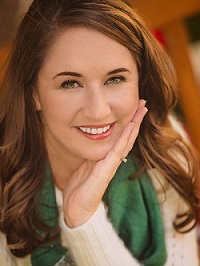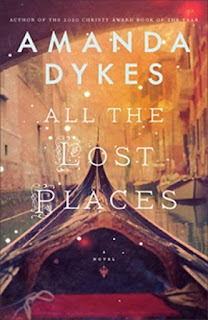In 1904 San Francisco, Daniel Goodman, having served time in jail, makes restitution to the parties he stole from during his years of thievery. Unable to face his mother, who he feels he has irreparably shamed, Daniel still suffers the aftereffects of an injury. He has lost his ability to visualize images in his mind and draw from memory, although he’s still able to create art.
To help his mother out financially, he takes an unexpected job offer: to travel to his mother’s home city of Venice, locate artifacts, sketch images of local sights, and procure and translate books for the library of a proposed “Venice of America” cultural center. One of the books on his list is a title Daniel has owned from childhood: The Book of Waters, an unfinished fairy tale. It’s a rare volume, and Daniel wonders if any other editions will tell the rest of the story. When he reaches Venice, he meets a curious bookseller named Vittoria who shows him the city and helps with his search.
 |
| author Amanda Dykes |
As Daniel proceeds with his translation of The Book of Waters, that book’s story unfolds. In 1807, the former Republic of Venice is under French control following conflict with Napoleonic France and Austria, and the abdication of the last Doge. A small baby found floating alone in a basket – much like Moses – within a gondola is rescued and then raised, in shared fashion, by five individuals from different walks of life. A note with the child says his name is Sebastien, and he is given the last name of Trovato,“found.” Sebastien grows up surrounded by his foster parents’ professions – glassmaking, printing, lace-making, gardening, piloting a gondola – and is greatly loved yet always wonders about his true identity.
The majesty and history of the islands and waterways of Venice permeate the novel’s pages as it explores both protagonists’ quests for belonging.
And always, in the distance or all around him, the city rose from the sea in a hundred and more fragmented pieces, cobbled together with bridges and boats.
I am like you, Venice seemed to say. A patchwork life, whole and yet broken.
The novel’s pacing is unhurried, proceeding much like a gondola as it wends its way through Venice’s storied canals and lagoons. Amanda Dykes is an expert at shaping words into moods, and her writing expresses the oft-cited theme of chiaroscuro – the interplay of light and shadow, both in art and in life. While some of the symbolism will have additional meaning for Christian readers, All the Lost Places doesn’t require a religious background to be appreciated as a haunting and emotionally fulfilling read.
All the Lost Places is published by Bethany House this month; I reviewed it from a NetGalley copy for the author's blog tour.








Thanks for sharing your thoughts, Sarah. Wishing you a lovely holiday season.
ReplyDeleteLikewise, hope you have a good holiday as well!
ReplyDelete